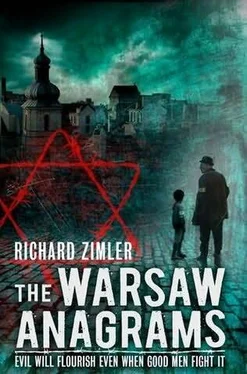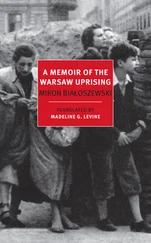I read until nightfall about kids who’d been raped, beaten and starved – usually by their parents or other relatives – but I couldn’t find any who’d been mutilated like Adam and Anna.
Of the unfortunate children I read about that day, I remember a French girl named Adelina Defert most of all. Her parents had locked her in a small wooden box from the age of eight to seventeen. They’d tied her down, whipped her and burned her with red-hot charcoals, and to torture her further her mother had washed her wounds with nitric acid. When Adelina was finally rescued, her straw mattress was teeming with insects, and the rags she used for blankets were soaked with pus.
Reading about Adelina gave me the idea that her parents would have adored running the ghettos across Poland. An insight? Maybe Adam’s murderer wanted nothing but the pleasure of disfiguring what was beautiful.
Gratuitous cruelty… We have to admit it never goes out of style, and the Nazis had raised it to the level of a philosophy.
All temples are metaphors for the human body; and it was the body that gave birth to the notion of holiness . A professor of mine had told me that in Vienna, but I’d been too young to understand. Now, I realized he’d been right, and what that meant to me now was that the murderer wanted to sever all holiness from the world.
Ziv knocked at my door that evening. He’d come over a few times after Stefa’s death but he always looked as if he was about to burst into tears and only stayed a couple of minutes. Since her suicide, he’d become as pale as ivory, and so gaunt that his pimply forehead jutted out over his eyes.
Under his arm he held his alabaster chessboard. ‘How about a game before bed, Dr Cohen?’ he asked, trying to sound cheerful.
‘I don’t think so. My mind… it’s all over the place.’
He looked so forlorn that I invited him to talk with me in the kitchen. I offered him one of the potato pancakes that Ida Tarnowski had made for me, but he turned me down. Looking at his unhappy face, I said, ‘All right, let’s see if I can beat you this time.’
His reply was a glorious smile.
As we played, I pretended not to notice he was losing on purpose, but not even the village idiot in a Russian novel could make such numbskull moves.
To Ziv, losing on purpose must have meant that we could be generous to each other – why else make such a sacrifice? I guessed that not many people had ever treated him well. And that he’d been building up his courage to give me the gift of his loss since Stefa’s death.
Early the next morning, I took a rickshaw to Ogrodowa Street to question the father of the girl who had died after her abortion; I had to make sure she hadn’t been disfigured.
Mr Szwebel had oily black hair falling over his ears, wild green eyes and a scruffy beard. He wore long flannel pyjamas and a stained old prayer shawl over his shoulders – a Jewish Rasputin. I told him that Mikael Tengmann’s nurse had given me his address, but that he must never tell that to anyone, and he agreed.
When we shook hands, I noticed his fingernails were long and filthy. I feared that his answers to my questions would become manic rants, but throughout our conversation he spoke to me in a quiet and well-considered voice. We sat at his kitchen table, and he poured mint tea for us into slender glasses.
‘I’ve come about your daughter,’ I said to him.
‘I figured that’s what it was.’
‘I understand she had an operation.’
‘Yes, but I’m afraid I don’t know much about what took place,’ he replied.
‘But you know that Mikael Tengmann performed it?’
‘That’s what I’ve been told. He denied it.’
‘You don’t seem angry about that.’
‘Anger is of no help where we live, Dr Cohen.’
‘His nurse, Anka, said you knew your daughter Esther had been pregnant.’
‘Yes.’ He stood up and took a bowl of stewed prunes from the counter, then grabbed a tarnished spoon and handed it to me. ‘Eat something,’ he told me, putting the fruit in front of me. ‘You’re way too thin.’
‘So are you,’ I observed, smiling.
‘That’s because I don’t want to leave the ghetto with anything weighing me down,’ he replied. ‘But it’s different with you. Your time hasn’t come yet.’
‘How can you be so sure?’
‘Let’s just say that traumas can sometimes improve our vision.’
To please him, I spooned up one of his prunes, but its burst of sweetness only served to distress me; I didn’t want to let myself believe that I could one day return to a life of small delights.
‘Did Esther ever say if anyone had threatened her in any way?’ I continued.
‘No.’
‘What did she tell you about Dr Tengmann?’
He took a thoughtful sip of his tea. ‘We’d only heard of him – of the procedures he performed. We hadn’t been to see him. In fact, we’d agreed that she would continue with the pregnancy – at least that’s what I thought we’d agreed. Esther went to him without telling me.’
‘And do you know who the father of her baby was?’ I was testing for anyone who might have known Adam or Anna.
‘Her fiancé, Felix Perlmutter.’
I didn’t know him. I explained briefly about Anna and Adam. Mr Szwebel looked away, revealing emotion only in his frequent blinking. In answer to my subsequent question, he shook his head. ‘No, nothing was cut from Esther,’ he told me. ‘At least nothing outside her body. She haemorrhaged badly on her inside.’
‘Do you know if she could sing?’ I asked.
‘What?’
‘Had Esther a good singing voice?’ I clarified.
‘I’m not sure. She wasn’t a musical girl. But I don’t understand what that has to do with anything.’
‘I’ve a friend who started a chorus for boys and girls. I’m wondering if she ever met him. His name is Rowan Klaus.’
‘No, she never spoke of him. Though I suppose it’s possible she was keeping one more secret from me.’
It started to snow as I made my way home, and the moonlit cascade of those cold blossoms endlessly falling on to me and the rooftops and streets, covering all the muck and disorder, was so wondrous and complete that for one moment everything in the world seemed to be united against a common enemy.
The flakes stuck to my gloves – crystalline and perfect – then melted for ever.
I was moved.
Except that when my feeling of transcendence vanished, I hated all the beauty around me as one can only hate what one has loved as a child.
I spotted Bina and her mother down the street, selling their pickled vegetables, but I didn’t dare go to them.
Izzy was waiting for me in my apartment, seated on my bed. He’d taken down a figurative print by Kokoschka that Stefa had kept over her bed – a no-nonsense young woman with her hand on her hip, ready to vanquish any and all opponents. I’d bought it for her because the woman reminded me of her. He was polishing the glass.
‘Was it very dusty?’ I asked.
‘Filthy!’ He held up his rag to show me the yellow-brown grime he’d removed, then stood the print in his lap and sat up straight. ‘I’ve just heard that the Jewish Council is assigning tenants to move into the apartments of people who’ve died – to cope with the thousands of new arrivals from Danzig and everywhere else. So before you have someone move in that you can’t stand, I suggest you take in Bina and her mother.’
‘Izzy, you’re obsessed with that girl!’
‘You’d prefer she starve to death under our very eyes?’ he demanded.
‘But she’s like too soft a pillow. She irritates me.’
I made that silly criticism because I couldn’t think of a real reason to dislike her.
Читать дальше












